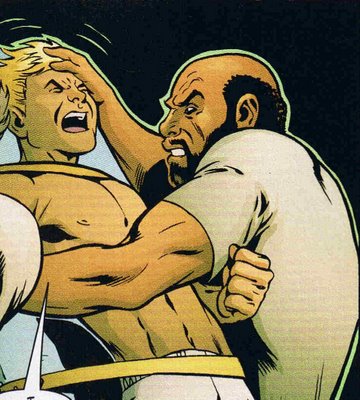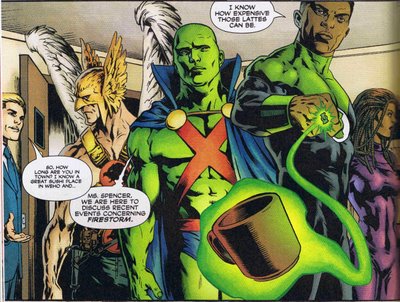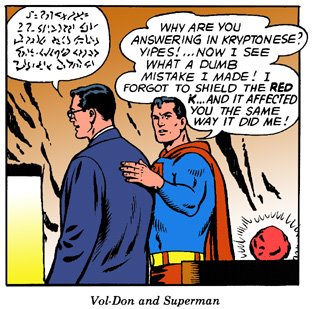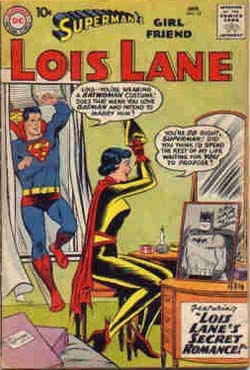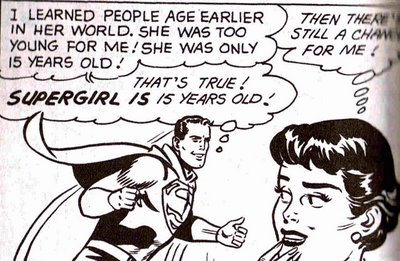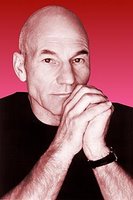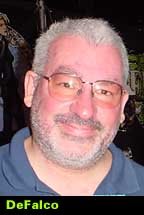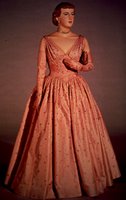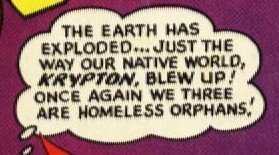For those of you enjoying the total insanity that is "Battle for Bludhaven", I need to draw your attention to Professor Radium. You know, the guy who looks like a green Hugo Strange.
The rest of the characters being reintroduced in the BFB are crazy Silver and Bronze Age commentaries on the post-WWII nuclear era. Prof. Radium is not.
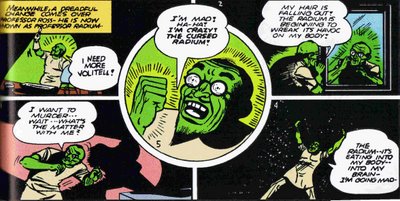 I'm guessing Prof. Radium was a Joker fan, because he does that whole "look in the mirror with horror" scene, then goes bonkers and does the Joker's patented "YMCA dance while surfing" maneuver. Gotta love Gotham.
I'm guessing Prof. Radium was a Joker fan, because he does that whole "look in the mirror with horror" scene, then goes bonkers and does the Joker's patented "YMCA dance while surfing" maneuver. Gotta love Gotham.
BFB is Prof. Radium's first appearance since his original one in 1941. I love stuff like that. If you don't, well, then you're missing a big chunk of the fun of DC.
His real name is Henry Ross, and his hobby was inventing radium-based serums that can bring the dead back to life. If only Gotham had had Heroclix; think how much needless waste of life could have been avoided if wackos like Henry spent their evenings trying to understand how to apply the Pummel Feat Card to figures with CCE instead of performing ill-advised scientific experiments.
Anyway, Henry figured out how to bring dogs back from the dead.
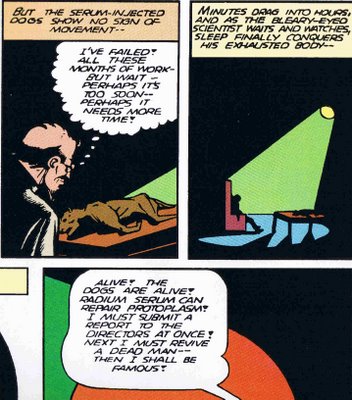 Look at those first two panels; that's art, people.
Look at those first two panels; that's art, people.
Golden Age artists may not have been as technically adept as modern ones, but they had a compensatory sense of style and composition that was nearly overwhelming. Are there any panels in any of the comics you bought this week that will impress or even haunt you like that second panel above? I don't think so.
You go, Henry. As a dog lover, I salute you, and note that here on Earth Prime
we are just beginning to figure how to do what Henry did over 60 years ago. Now, go re-read the first pic in this post, the one from BFB; clearly, Henry lost a dog or two tragically as a child and that left a lasting impression. Dude loves dogs, and his first thought for any science or technology is,
"How can this ease the lives of dog-owners?" Henry's A-okay in my book.
Sadly, his bosses don't believe in Henry's reanimated zombie dogs because he performed his experiments in the dead of night when no one was watching and might have substituted lookalike live dogs for the dead ones. In fact, they fire him for stealing thousands of dollars worth of radium for his unauthorized experiments. Fools! The utter fools!
Naturally, Henry's next step was:
(A) Repeat the experiment with credentialed witnesses.
(B) Publish a paper on his research and call for external verification.
(C) Prove that the zombie dogs were the original ones through DNA comparison.
(D) Post an mpeg of his reanimation experiment on YouTube.
Since this is the DCU, the answer is obviously (E):
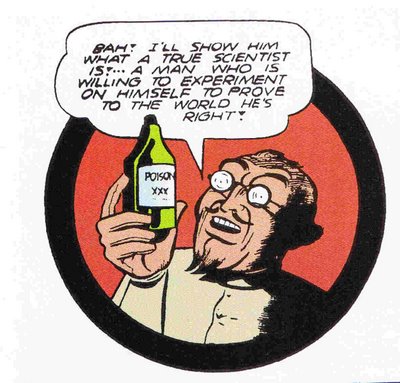 Later, Henry blames the radium for driving him crazy.
Later, Henry blames the radium for driving him crazy.
Personally, I'd say that began when he thought it was a good idea to drink a bottle of something green, labelled "poison" with three Xs on it. Where was Mr. Yuk when Henry needed him?
See, this is why I never became a full-fledged scientist; I just don't have the right mindset. That idea would never have occurred to me.
So Henry kills himself and leaves a note for a colleague on the bottle labelled POISON XXX saying, "Shoot me up with this gunk after I'm dead." This being a comic book, the colleague immediately does so, instead of, say, calling the police or shrieking like a little girl. Yet more evidence I don't have what it takes to be a scientist.
Which may, in fact, be fortunate for me, since soon after Henry reanimates, he begins to glow with radiation and accidently irradiates to death the very colleague who brought him back to life. Oops; one less card to send at Christmastime, though.
But Henry "Professor Radium" Ross is equal to the emergency and develops a wonder cure for himself based on the non-existent chemical Volitell, which you can tell from its very name is an expensive drug found only at hospitals that Henry is going to have to start stealing to control his condition.
But first, a quick stop off to kill his girlfriend!
Stories used to be so much more gosh-darned efficient .
We've not seen this women before, the only way we know she's his girlfriend is through context, and she is not mentioned again. Yet she exactly serves her literary purpose of heightening the villain's personal Greek tragedy. I think modern writers are afraid that if they write scenes this efficiently, readers will have heart attacks because the plot's advancing too quickly.
You know, every time I hear someone whining about the "women in refrigerators" thing or the Rolling Head of Pantha "problem" with modern "bloodthirsty" writers, I feel like sending them every Golden Age panel where people die unceremoniously in the most horrible ways with barely a second mention. Because in a Golden Age story, there's an average of one per page. Men, women, dogs, children; I tell you, they used to drop like flies.
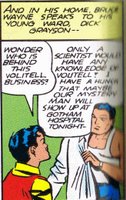
Fortunately, the Golden Age Batman gets one of his ridiculous hunches, something he does, oh, about once a story. These hunches are invariably correct; the GA Batman was a precog on a level with Agatha in
Minority Report. If Batman says,
"I have a hunch, Robin, that tonight an embittered ex-Nazi scientist may release a plague of robotic cicadas that will devastate the South American cocoa crops," then you dang well better stock up on Hersey bars, pronto, buster. No wonder Bruce Wayne does so well in the stock market.
Read enough stories and you'll notice that inspiration often comes to Bruce when he's undressing in front of his youthful ward. Who can fathom the mysteries of precognition? By the way, rumor has it the descendants of Batman are the first colonists on Naltor; it's all a plot by Evil Skeets, I'm told.
Sure enough, Batman's hunch is correct and out pops Henry in a startlingly unattractive containment suit. Henry, cornered by B&R, does what anyone with the deadly power of radioactivity literally at his fingertips would do:
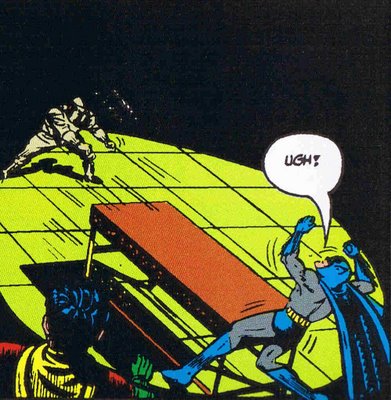 Ouch. So much for the "descendants of Batman" theory.
Ouch. So much for the "descendants of Batman" theory.
...shoves a table into Batman's crotch..
Surprisingly lithe in his bulky containment suit, Henry shimmies down the drainpipe, which he destroys with his radioactivitiosity to prevent the Caped Clods from following. Remember, this is not the modern Batman, who's 102 rippling rockhard points of
Leap/Climbing, Outwittish Willpower; this is the Golden Age Batman, who's more like
the 47 point Icons starter set Batman, and faints if you throw the Gumball Machine token at him.
At this point, Batman does some fancy lab work to figure out that Prof. Radium is, in fact... Henry Ross! Thank gods Gotham City keeps on file the fingerprints of all civil service workers; no really, that's what Commissioner Gordon says. Yikes.
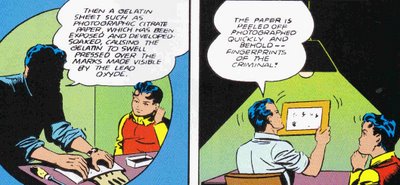 CSI: Gotham City. You see, Batman used to be a detective. Crazy idea, huh?
CSI: Gotham City. You see, Batman used to be a detective. Crazy idea, huh?
Poor Robin always used to nod off during these parts and had to hold his head up to stay awake.
Why didn't Batman or the police just read the article in the paper that said, "Wild-Eyed Civil Servant Fired for Stealing Massive Amounts of Radium"? Probably because it got bumped by one of Batman's silly "Trap Notices", I'll wager.

You see, Batman & Robin naturally did what they
ALWAYS do: put a fake notice in the newpapers to lure the villain into a trap. In the Golden Age, the Gotham papers would reserve at least two or three columns per issue, just for Batman's little fake stories. I can just hear the Editor going over them:
"Jeez, this one's got Mrs. Van Landorpf planning to wear her emeralds with tweed, ferchrissake; yeah, like the Penguin's gonna fall for that. I think he's letting Robin write these things!"
Just as naturally, Henry falls for it. They always fall for it. Except for the Penguin, who's too smart for that crap.
Anyway, Batman & Robin, now wearing insulating rubberized versions of their costumes for protection, face off against Prof. Radium at the shipyards because it (A) looks dramatic (B) provides plenty of props to fight with (C) offers lots of opportunity to fall. Which is, of course, exactly what Henry does, right into the (C), which further proves that he's a Joker fan, 'cuz that's just what the Joker'd do.
Of course, there's just one little loose end... the zombie dog.
What happened to Henry must have happened to the dog he reanimated. So where's Rusty the Radiumhound? And why...
 is he not kicking this "dog" 's little canoid kiester?!
is he not kicking this "dog" 's little canoid kiester?!
 when Peter the Pufferfish was unavailable for this story.
when Peter the Pufferfish was unavailable for this story. when Peter the Pufferfish was unavailable for this story.
when Peter the Pufferfish was unavailable for this story. Don't lie to yourself; you don't really miss her either.
Don't lie to yourself; you don't really miss her either. Don't lie to yourself; you don't really miss her either.
Don't lie to yourself; you don't really miss her either. "No ... dance poles ... in woods! Must-- use tree!"
"No ... dance poles ... in woods! Must-- use tree!" "No ... dance poles ... in woods! Must-- use tree!"
"No ... dance poles ... in woods! Must-- use tree!" Just thinking about it makes me feel faint.
Just thinking about it makes me feel faint. Just thinking about it makes me feel faint.
Just thinking about it makes me feel faint. How bad is it when your behavior appalls Vixen and Vibe?
How bad is it when your behavior appalls Vixen and Vibe? How bad is it when your behavior appalls Vixen and Vibe?
How bad is it when your behavior appalls Vixen and Vibe?


